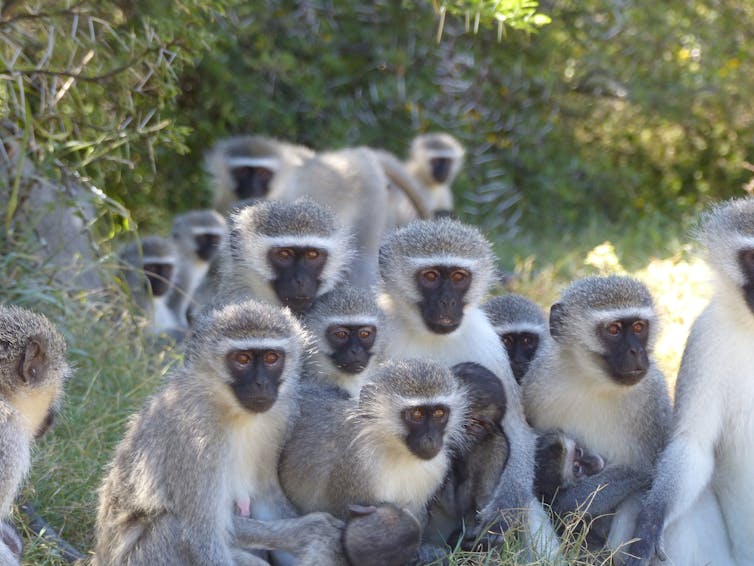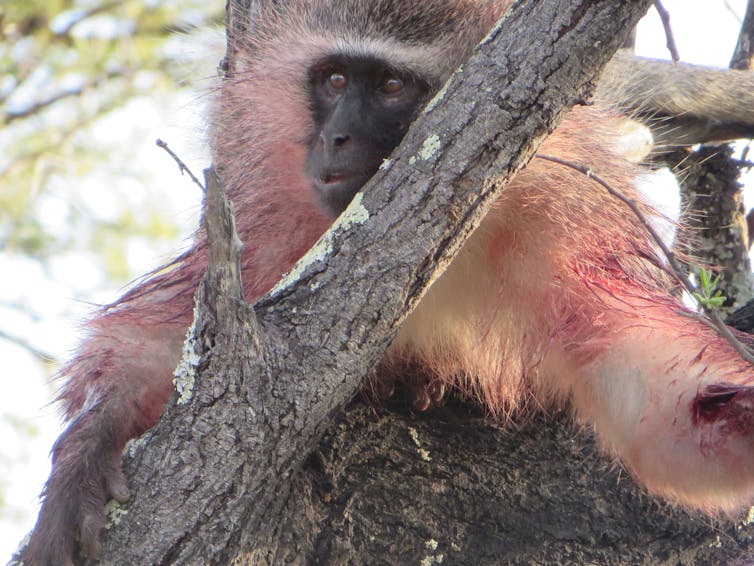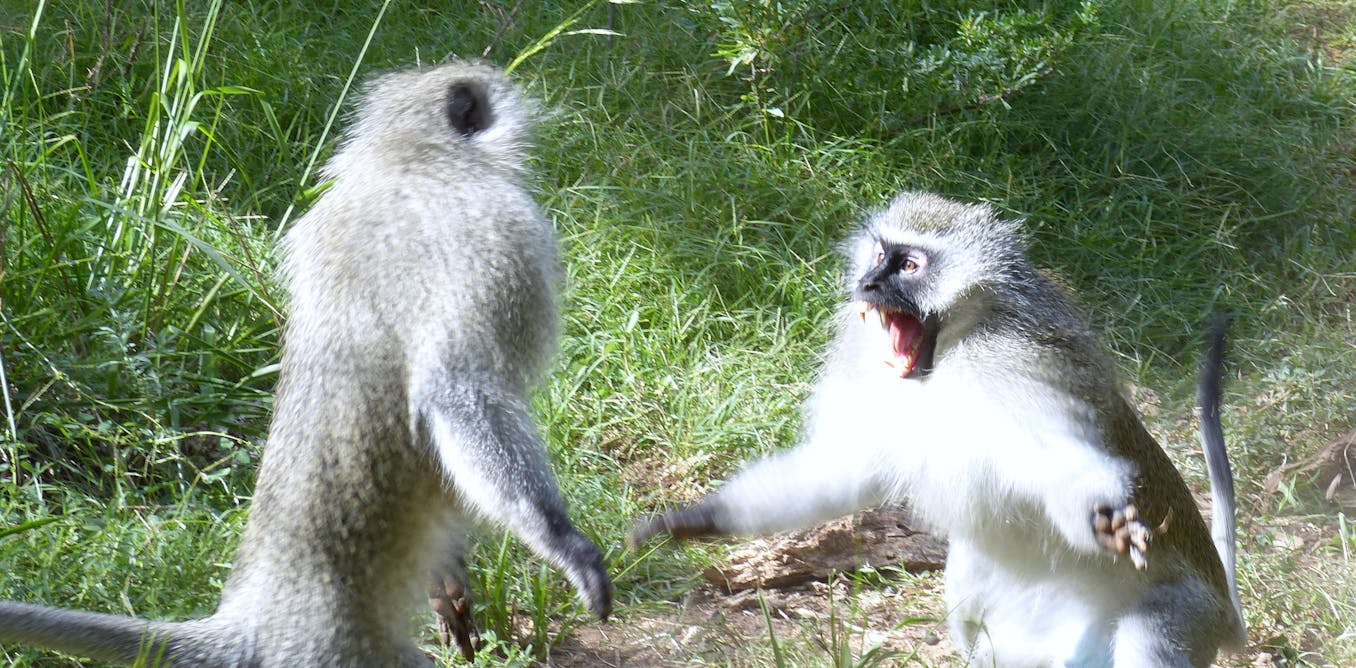[ad_1]
Life within the wild will be powerful, and generally animals don’t have the luxurious of taking day trip when they’re sick. That’s actually the fact of life for vervet monkeys residing in Southern Africa, despite the fact that parasites and viruses are an ever-present part of animal life.
We all know how folks reply to an infection. Lack of urge for food and staying in mattress or resting are among the methods we adapt to being unwell. Being much less lively and consuming much less frees up vitality to battle the an infection – even digesting meals makes use of vitality. This behaviour could assist us recuperate and is a key part of our survival.
My colleagues and I wished to know extra about how monkeys reply to sickness, and the way a illness travels inside and between animal teams. That is important if we’re to sort out the massive impression that an infection can have on monkey inhabitants survival. Whereas the causes of an infection have been the focus of a lot consideration, till now we knew little or no in regards to the social penalties of an infection in these monkeys.
For over ten years our worldwide group of researchers have studied the behaviour and physiology of wild vervet monkeys residing within the Jap Cape, South Africa. They stay in giant social troops – as much as 40 monkeys per troop – and former analysis has proven that they’re routinely uncovered to a vary of environmental stressors akin to excessive warmth and drought, in addition to competitors for meals.

Chris Younger, Creator offered (no reuse)
In our most up-to-date research of three teams of untamed vervet monkey, we examined the impact of getting sick on particular person vervet monkey’s social standing.
How we studied fever
As with people, when a monkey will get an an infection, they will get feverish.
We implanted miniature information loggers – slender cylinders about 3cm lengthy – into every monkey’s stomach and recorded core physique temperature contained in the abdomen each 5 minutes. That allowed us to doc for the primary time the prevalence of fever in a wild monkey inhabitants.
After the research interval, we returned to take the loggers out, with the assistance of a group of vets from the College of the Witwatersrand. We wanted to do that to get the information, and clearly additionally for the sake of the monkeys.
In our research group of 59 vervet monkeys, we detected 128 fevers in 43 monkeys over seven years. Feverish monkeys reached a median (imply) each day physique temperature of about 39°C, with the best physique temperature on file being almost 42°C. Fevers lasted between two and 20 days.
On the similar time, we stored an in depth account of the monkeys’ behaviour and social interactions. Identical to us, they lose their urge for food and spend extra time resting. However they will’t keep out of motion for too lengthy. Even sick monkeys must sustain with their troop if they’re to maintain themselves out of attain of predators, akin to cheetah, jackal and caracal (a wild cat). Monkeys additionally depend on their group mates to assist battle off neighbouring troops as they compete for meals, water and sleep websites.
The danger of assault
Along with the behavioural penalties of fever, we have been in a position to present, for the primary time, a hidden and beforehand unrecognised value of social interactions – feverish monkeys have been attacked whereas they have been down.
Inside a monkey troop, competitors is rife – monkeys battle for meals, standing and mates. Though it’s unclear if a monkey is aware of that one in every of their troop is sick, they do recognise the weakened state of their troop mate, maybe as a result of they’re out of types or are much less attentive to extra refined exchanges of dominance.
Some people appeared to make use of this to their benefit.
We found that when monkeys have been feverish they have been twice as prone to be attacked by one in every of their group mates and 6 occasions extra prone to change into injured because of this. Sick animals have been focused with aggression once they have been least in a position to battle again, probably bettering the attacker’s social standing, entry to sources, or place within the troop.
We noticed a very uncommon sequence of occasions in one in every of our troops of 25 monkeys.
Feminine vervets stay in comparatively secure hierarchies. However when Brie, the alpha feminine, fell sick she was subjected to a torrent of abuse from the troop’s beta feminine, Tyvara. Over seven days, Brie was attacked by her on 12 events and acquired 4 completely different accidents. For sure, Brie’s alpha dominance standing was no extra and she or he slipped down the hierarchy.

Rosemary Blersch, Creator offered (no reuse)
Bystanders additionally appeared to profit from the weakened standing of a sick particular person, on this case by manoeuvring up the hierarchy, and these fever-induced social interactions are prone to have vital long-term social and health penalties for the people concerned.
Learn extra:
How orangutan moms assist their offspring study
However that’s not all. The feverish monkeys spent simply as a lot time grooming, or being groomed, by different group members despite the fact that they have been sick. Whereas it might sound widespread sense to keep away from different sick people, our findings recommend that social engagement most likely displays a trade-off between the propensity to get contaminated by a contagious particular person and the social worth and different advantages that the connection affords – akin to the flexibility to manage in tough environments and efficiently elevate offspring. Or maybe monkeys merely don’t know that their troop mates are sick or may cross them a nasty sickness.
The response of vervet monkeys to an infection means that the unfold of illness among the many troop is probably going. Now we now have seen that there’s a value of being sociable when feverish, the place weak people are open to assault, maybe we must always flip our consideration to the query of the impression of social integration amongst monkeys on the unfold of illness inside and between teams.
[ad_2]
